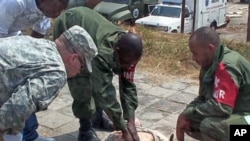In the conflict-ravaged Democratic Republic of Congo, the country's own military is one of the biggest causes of instability. The 100,000-strong army - a mix of government soldiers and former rebels - has been accused of robbing, enslaving and raping Congolese civilians. The U.S. military has begun deploying trainers to help reform the troubled force, one small step at a time.
In Kinshasa, the capital of the Democratic Republic of Congo, there are injured Americans on the streets. Their injuries are being staged as part of a two-week training exercise for 300 Congolese army medical personnel codenamed "Medflag '10." It is being overseen by Africom, the US military command covering Africa.
Lt. Col. Todd Johnston with the U.S. Army said, "For the Congolese, it's a chance to learn some techniques from the U.S. Army."
The need for the training is clear. A study by the aid group Oxfam found that soldiers and police commit two-thirds of the rapes in Congo. The Americans hope to begin turning around the army by providing a positive example.
State Department Spokesman Marc Dillard said, "The real objective is to help or sustain and support the government of Congo so they can do things like better protect the civilian population and better provide security."
It's a tough job. Primitive conditions and a lack of modern equipment are two challenges. Language is another.
Army Sgt. Stuart Hammer said, "The most difficult portion is the language barrier. When we use an interpreter, they interpret into French, and a lot of Congolese soldiers are speaking Lingala, so it gets interpreted a second time. So the time factor is extended greatly due to the interpretation and the second interpretation."
What's more, many Congolese soldiers are former rebels who were invited to join the army as part of a peace deal.
Marcel Stoessel is Congo Director for Oxfam International. He said, "It's difficult to reform the Congolese army because it's a collection of armed groups that's been integrated, not an army that's been constructed from scratch."
As a final exam, the Americans required the newly-trained Congolese troops to interact with civilians at a free health clinic in Kinshasa. American and Congolese doctors, dentists and medics worked side by side treating around 2,000 patients over several days.
U.S. Army Maj. Curt Kroh said, "The biggest thing we help with is medicines. They're short on medicines. We bring a lot of that to the table, as well as the education piece. We trade treatment methods and ideas to help fine-tune their care."
At the same time, another U.S. Army team is wrapping up a year of training another Congolese unit in the nearby city of Kisangani.
Lt. Col. Johnston said, "The U.S. has determined it wants to be more involved in Africa. This is simply the military part of that increased engagement at all levels."
The two training efforts are just the beginning of America's growing involvement in Congo's army reform.




